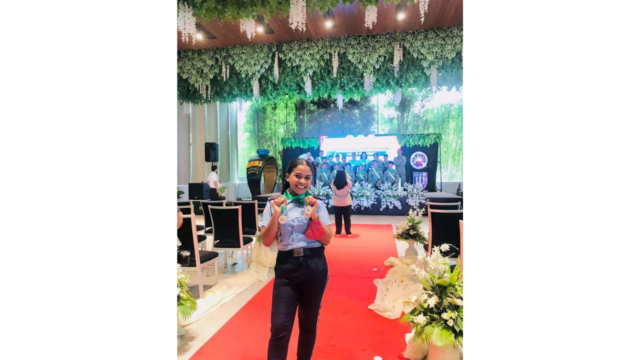
In a profession typically dominated by men, an Aeta woman makes ‘herstory’ as the first woman from the Mag-Indi tribe in Pampanga to pass the Criminologist Licensure Examination (CLE). Lady Anne Duya, 23, who hails from the Katutubo Village in Barangay Planas, Porac, proves that sex and ethnicity are not hindrances when one is determined to reach one’s goals.

Life in the community
Lady Anne shared that her barangay is not included in the upland community, but their neighborhood is specific for the Aeta, consisting of about 300 families. According to her, life in the village is not easy but it is bearable. Unlike the usual indigenous peoples (IPs) who mainly rely on farming for their daily living, majority of the people in her village work in factories and construction sites, but there are still some whose main source of income is agriculture.
The fourth of seven siblings, they live off of her mother’s income from being a housekeeper. Her mother’s main partner in supporting their family is one of her older brothers who is their breadwinner. Meanwhile, his father occasionally goes up to the mountains to harvest crops to sell and supplement their daily expenses. This, however, is not a steady source of income because planting is only seasonal.
Pursuing dreams through scholarships
Being the first one to graduate from college in their family, she was able to do so with the help of various scholarship grants.
Lady Anne is one of the scholars of the National Commission on Indigenous Peoples (NCIP) which aims to make available, accessible, and meaningful educational assistance to poor but deserving Indigenous Cultural Communities (ICCs)/IPs and to encourage them to undergo post-secondary college education in priority relevant courses.
“We offer two types of scholarships. The first one is a merit-based scholarship for college students wherein the grantee’s general weighted average should not be lower than 85 percent; the grantee should belong to the top 10 graduating class; and is required to pass the examinations,” NCIP regional information officer Louis Genesis David said.
Meanwhile, the second one is an educational assistance intended for primary and secondary education students whose general weighted average should not be lower than 80 percent.
The assistance is provided by the NCIP to cover various educational expenses such as miscellaneous fees, book allowance, uniforms, transportation, and others.
Those enrolled under the educational assistance program receive annual grants amounting to P2,500 for elementary; P5,000 for junior high school; P7,500 for senior high school; and P10,000 for college.
Meanwhile, scholars under the merit-based scholarship program receive P25,000 financial aid per semester.
NCIP scholars are enrolled in various courses such as Business Administration (Accounting, Marketing, Management, Economics, Entrepreneurship), Education, Agriculture, Community Development, Forestry and Environment Studies (Forestry, Environmental Science, Agro-Forestry), Anthropology, Social Work, Social Sciences (AB courses), Medical (Nursing, Midwifery, Medical Technology, etc.), Engineering, Foreign Service, Criminology, and Geology.
Being a consistent honor student since grade school, Lady Anne was also able to avail scholarship from a religious organization in her elementary days, which helped her provide for her uniform and daily allowance before becoming a NCIP scholar in high school.
During her college days, she also qualified as one of the scholars of the provincial government, which greatly helped her pay for her tuition and other miscellaneous fees as a BS Criminology student at the Central Luzon College of Science and Technology in the City of San Fernando.
“My various scholarships greatly helped me finish my studies. What I receive is enough to pay for my school fees, including my projects. My only expenses out of my own pocket are dorm rental fees and daily allowance for food because my school is quite far from home,” Duya said.
Reaching the finish line despite challenges
Lady Anne said that pursuing her goals is not a walk in the park. She said that she experienced personal struggles and a sense of guilt because she knows that going to college entails financial expenses.
“Sometimes, I feel guilty because even though my parents are very willing to give me everything that I need for my studies, I know that they have to really work hard for it. Not to mention the fact that I also have younger siblings and other household expenses, but the majority of what they earn goes to my allowance,” she said.
In terms of actual studying, she said her fourth year was especially challenging because she had to focus on the internship, academics, and thesis writing all at the same time. That, she added, is mentally and physically exhausting, and the internship also comes with additional costs.
Lady Anne admitted that aside from those struggles, what is more challenging and disheartening is the discrimination that she went through as many raised eyebrows and questioned her decision to enroll in Criminology. This proves that even though we have gained headway in terms of gender and cultural sensitivity and inclusivity, those issues still prevail in society.
“At school, I went through discrimination because of my ethnicity and physical appearance. Given that I am of short stature, I receive condescending looks that say ‘You’re just a woman, can you handle the training?’ There was also a time when someone told me that I will not pass the board examination,” she recalled.
Because of those experiences, Duya said she really had a hard time getting along with her classmates and other people in the school at first. However, she just focused on her goals to prove them wrong.
With her determination, she was able to earn her bachelor’s degree in July 2023. Not only that, she also received various awards in college such as Best in Thesis, Service Awardee, and Most Outstanding Criminology intern. Only a few months after her graduation, she received another piece of good news as she passed the February 2024 CLE.
An inspiration to many
When asked about her message to the youth, especially her fellow IPs, who want to pursue their studies despite the challenges, she reminded them not to give up or lose hope.
“When you have a dream, you have to make time, make sacrifices, and prioritize something if you want it to come true. Don’t let other people bring you down. Instead, make them an inspiration so that you will be stronger and you will improve even more,” she said.
She also urged them to always ask the Lord for guidance and to seize the opportunity to turn their dreams into reality.
“Don’t lose hope to dream even if they look down on us [IPs]. There are people that the Lord uses to help us. While there is an opportunity, let’s grab it because it is not every time that someone will help. We are very blessed because the government supports us so let’s not waste it,” she said.
Truly, with her passion and perseverance, she deserves to be looked up and emulated as an inspiring Filipina and an inspiring youth. (CLJD/MJSC-PIA 3)



